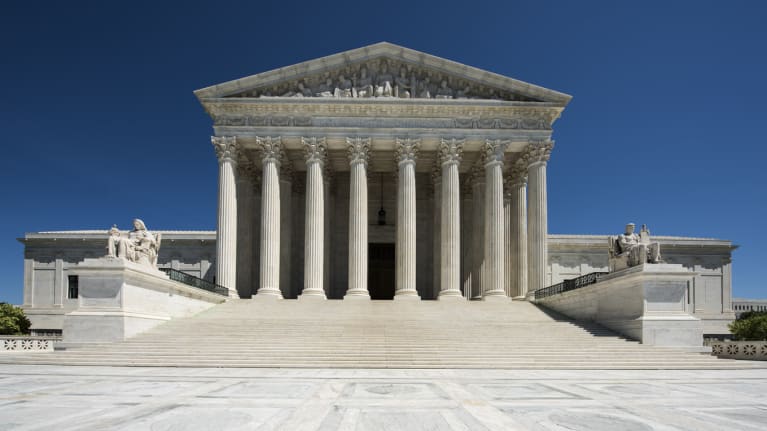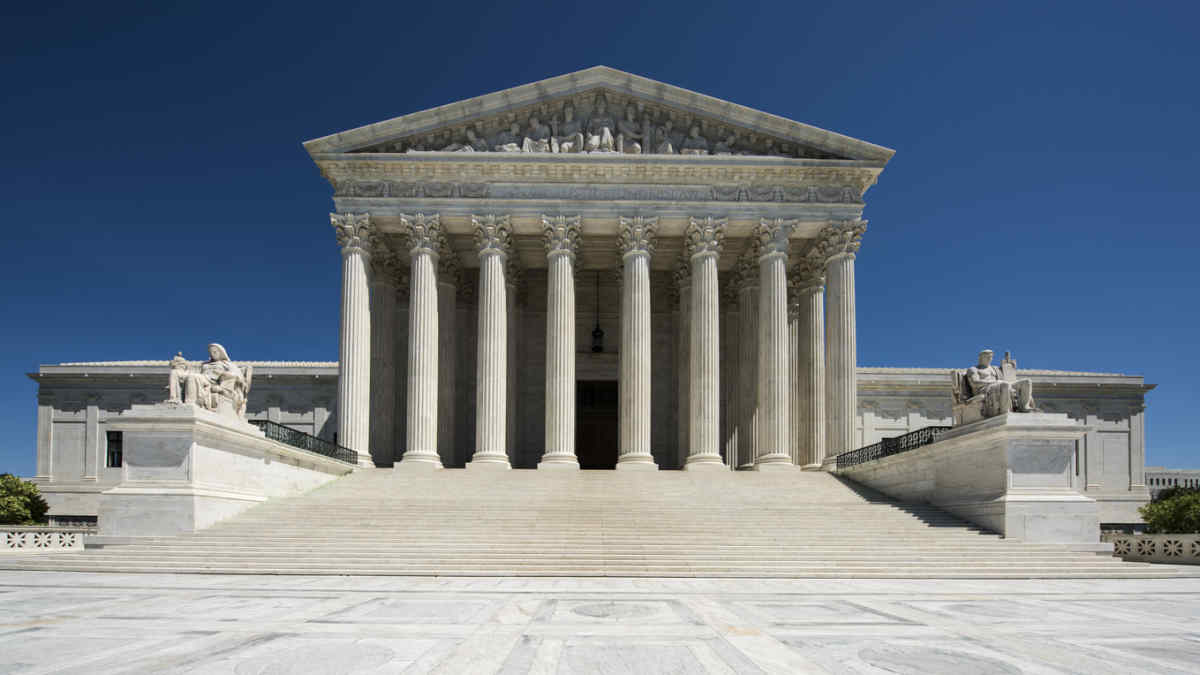

?Many employers are already aware of how scary it can seem to be on the receiving end of a federal agency’s investigation or action—be it the National Labor Relations Board, the Department of Labor, the Occupational Safety and Health Administration, the Equal Employment Opportunity Commission or some other regulatory body. But the Supreme Court is now faced with the question of whether it should give employers and citizens more tools to challenge the powers of the federal agencies when administrative proceedings are pending. Depending on how the Supreme Court rules, employers may get the chance to fight federal agencies from the outset instead of waiting for the administrative process to play out to get their day in court. Read on to get an employers’ summary of Axon Enterprise v. Federal Trade Commission and Securities and Exchange Commission v. Cochran—for a prediction on how the case may be decided.
What Are These Cases About?
Challenging a federal agency is daunting. Not only do the agencies have a virtually unlimited budget, they create, interpret and enforce their own rules. Businesses locked in a battle with a federal agency often face the choice of either agreeing to the agency’s terms or engaging in an expensive, years-long legal battle.
Often, the latter is so cost-prohibitive it has been referred to as a “bet-the-farm” scenario, with companies first having to pay attorneys to jump through legal hurdles before being able to challenge the federal agencies in court. Even succeeding in a later legal challenge won’t result in recovering the amount spent in defending the case. Where this becomes the most troubling is when there are underlying constitutional issues involved.
The cases now before the Supreme Court, Axon Enterprise v. Federal Trade Commission and Securities and Exchange Commission v. Cochran, involve similar laws outlining how “final orders” from those agencies are to be challenged. In both cases, those final orders have to be challenged in the court of appeals.
In Axon, the Federal Trade Commission (FTC) was investigating Axon Enterprise to determine whether its acquisition of a competitor violated federal antitrust laws, which Axon protested.
Similarly, in Cochran, a Texas accountant, Michelle Cochran, was accused of misconduct by the Securities and Exchange Commission (SEC). The agency sanctioned her and forced her to go through an administrative proceeding and the SEC appeals process.
Axon attempted to challenge the constitutionality of the FTC’s proceedings, while Cochran did the same against the SEC. The appellate courts, however, gave conflicting results. The 9th Circuit found in favor of the FTC, but the 5th Circuit allowed Cochran to pursue her constitutional challenge against the SEC without first going through the agency’s administrative processes.
The Supreme Court took up both cases, specifically on the question of whether the challenge to both the FTC’s and SEC’s use of administrative law judges could properly be heard by a federal district court without the need to first go through the agencies’ respective processes.
How Could the Supreme Court Decision Impact Employers?
As noted above, a number of federal regulatory agencies oversee workplace dealings and have the authority to bring claims against employers. Most notably, employers have the potential of a federal agency challenging their labor relations practices, wage and hour compliance, workplace safety standards and general human resources activity.
Unfortunately, employers are often forced to compromise when faced with regulatory challenges given the procedural nature of such claims and the resources necessary to defend against them. If the Supreme Court were to rule in favor of the challengers in these companion cases, employers could find themselves in a much more advantageous position when it comes to battling it out with these agencies in such situations.
Prediction: Employers Will Get a New Pathway
Based on our analysis and the way oral argument developed, we predict that the Supreme Court will open some avenues for employers to fight off administrative proceedings with some type of constitutional challenges in court without having to wait for the administrative process to play out. However, it is unclear how far the Supreme Court will go.
Many of the Supreme Court’s conservative justices seemed ready to side with the government’s challengers given the way oral argument developed. Justice Samuel Alito Jr., one of the Supreme Court’s most conservative justices, asked: “What sense does it make for a claim that goes to the very structure of the agency having to go through the administrative process?”
Chief Justice John Roberts Jr. also appeared compassionate to the challenger’s arguments, observing that lengthy administrative proceedings can be unduly burdensome, which “does make the case about the need for direct resolution of a related claim pretty strong.”
Some of the conversative Justices were even more forceful in their opposition to the government. Justice Neil Gorsuch noted that the relevant statutes in these cases only govern final agency actions, which all of the parties involved admitted at oral argument were not present here. To Justice Gorsuch, he thought, that “would be the end of the game.” He asked counsel multiple times, “What am I missing?”
The Supreme Court’s more liberal justices, however, were much more sympathetic to the government and the practical issues that could arise in allowing constitutional claims to survive in court while administrative proceedings were pending. Noting that litigants could possibly use constitutional claims to “superintend” or “do an end around” administrative enforcement, Justice Ketanji Brown Jackson asked counsel: “Why is that not a legitimate concern?”
Justice Sonia Sotomayor also voiced her concern with the challenger’s arguments, explaining that the line between what constitutional claims can and cannot be brought in court to fight agency action is “really hard to draw.” To that end, Justice Sotomayor does not think he Supreme Court “should be permitting district court interference” with administrative proceedings.
Predictions: The Breakdown
Stephen Gee: I think that Chief Justice Roberts will write a 7-2 majority opinion—joined by all but Justices Sotomayor and Jackson—holding the procedural due process challenge to both the FTC’s and SEC’s use of administrative law judges could properly be heard by a federal district court without the need to first go through the agencies’ respective administrative processes. Justice Robert’s opinion will hold there was no “fairly discernable” intent to limit jurisdiction in these two cases and that the agency has no particular expertise in constitutional claims, but also limit this ruling to the facts of the case. Therefore, Justice Roberts’ ruling will not create a rule that a constitutional challenge is always necessarily collateral to a statute’s review provisions.
Chad Zimlich: I believe that Justice Brett Kavanaugh will write the opinion for the majority (with Justices Clarence Thomas, Alito, Gorsuch and Amy Coney Barrett joining) that will rely upon the fact that, as there is no agency action being challenged, a constitutional challenge is necessarily “collateral” and the Administrative Procedure Act and agency-specific acts could not come into play—allowing the Supreme Court to resolve the constitutional challenges without going through the respective agencies’ processes. Chief Justice Roberts will author an opinion concurring in the result but with an alternative, more limited, reasoning (with Justice Elena Kagan joining). He will say there was no “fairly discernable” intent to limit jurisdiction here, and that the agency has no particular expertise in constitutional claims—but refusing to adopt a rule that a constitutional challenge is necessarily collateral to a statute’s review provisions. Justice Sotomayor will author a dissenting opinion (with Justice Jackson joining) finding the APA and agency-specific acts allow for meaningful review and that the majority opinion unnecessarily opens the door for an influx of litigation based upon related—or fabricated—constitutional challenges and arguing the majority’s opinion is unworkable.
Drew Tate: I think that Chief Justice Roberts will write a (5-2-2) majority opinion holding that that there is no “fairly discernable” intent by Congress to limit jurisdiction in these cases and that precedent should preclude jurisdiction stripping in these cases. Specifically, the majority opinion will reason that structural constitutional challenges to administrative proceedings (as opposed to due process claims) are “wholly collateral” to FTC and SEC statutory review schemes and that these type of challenges are outside these agencies’ expertise. The majority will also reason that parties should not have to undergo a burdensome administrative process to raise structural constitutional challenges before they can seek review in court. Justices Gorsuch will author an opinion concurring in the judgment (with Justice Thomas joining) holding that neither the statutory review schemes are implicated and thus the district courts have jurisdiction over constitutional challenges because there is no final agency order in either of these cases. Finally, Justice Sotomayor will author a dissenting opinion (with Justice Jackson joining) holding that Congress impliedly intended to subsume interlocutory challenges to final agency orders under the FTC and SEC statutory review schemes, the majority opinion’s rule delineating a difference between structural and due process constitutional claims will be unworkable, and the correct course of action for any challenges to agency action take place at the end administrative proceedings.
Conclusion
The Supreme Court heard oral arguments in these cases on Nov. 7, and thus a decision could be released at any time. It is anticipated, however, that the Supreme Court will release rulings on both Axon and Cochran by the end of June 2023 at the very latest.
Stephen Gee is an attorney with Fisher Phillips in Detroit. Drew Tate is an attorney with Fisher Phillips in Los Angeles. Chad Zimlich is an attorney with Fisher Phillips in Louisville, Ky. © 2023 Fisher Phillips. All rights reserved. Reposted with permission.

